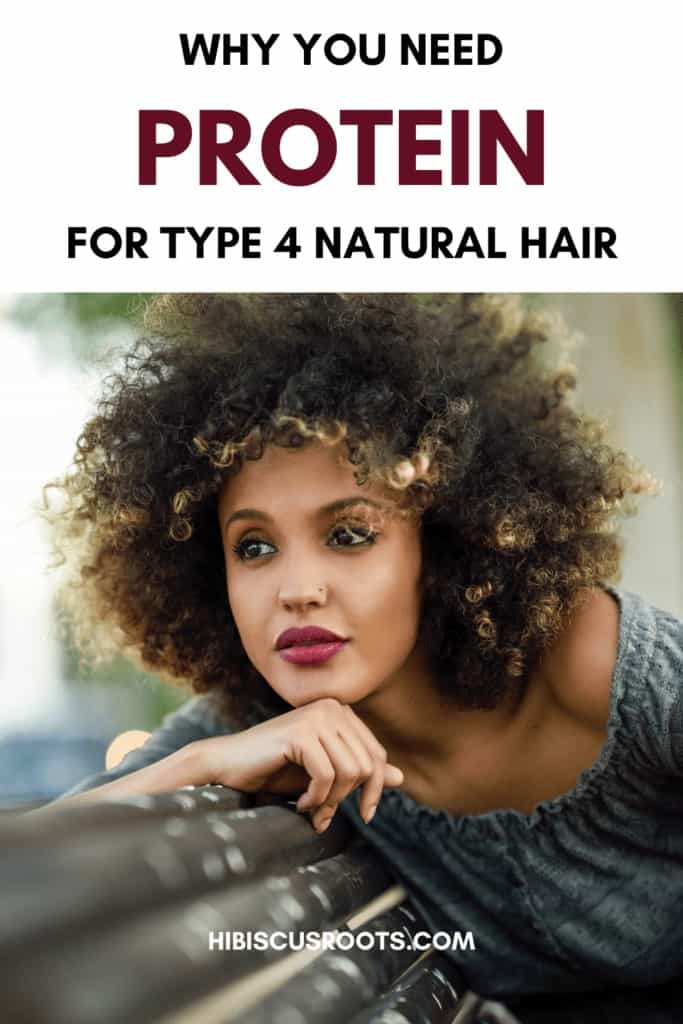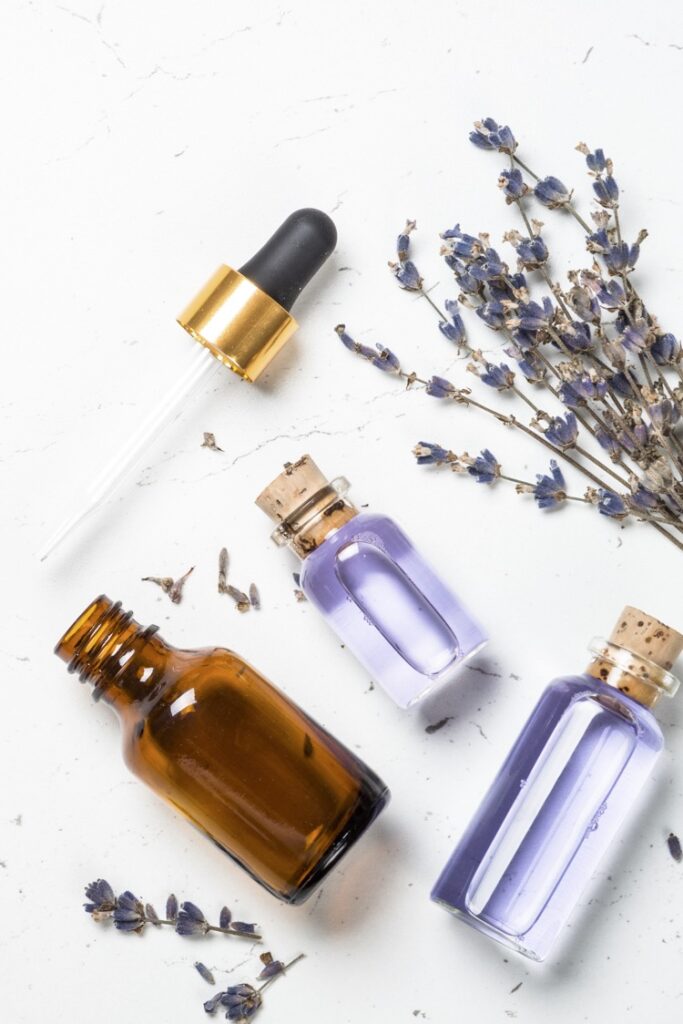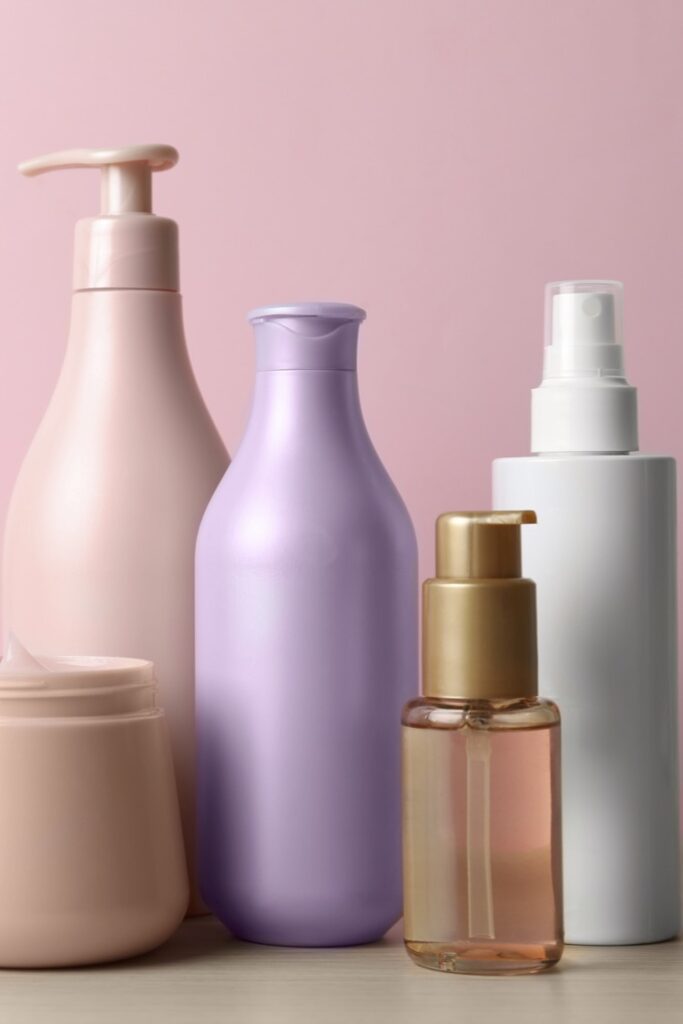Updated: December 29, 2020

If you’ve thought about doing a protein treatment and wondered what the benefits were for your natural hair — we’re finally going to put that curiosity to rest.
Whether your hair is natural, relaxed, curly, coily, or kinky – your hair needs protein! So we will be covering some benefits of protein treatment for natural hair.
Hair is made up of keratin which is a type of protein that is produced in your hair follicles. As these follicles produce new hair cells, it pushes the older cells out through the surface of the skin. This is a pretty simplified explanation of how hair grows. 1
It is also important to understand that because our hair is made up of protein, it requires protein to grow. This includes both protein consumed internally, to feed those follicles we described above, and protein treatments applied to the surface of natural hair, to keep it strong.
Protein is just one of many elements the body requires to maintain the overall balance and health of the hair strand.
This post goes into detail about the importance of maintaining moisture and protein balance in your hair routine, and how doing so promotes hair growth and length retention.
And because this is a website about Ayurvedic natural hair care solutions, we’re going to be suggesting some all-natural ways to strengthen hair and balance protein in the hair strands!
What are the Benefits of a Protein Treatment for Natural Hair
1. Protein strengthens the hair
Protein strengthens the hair by filling up any holes and gaps in the strand that develop over time. These holes appear on the hair strand because of normal wear like styling and manipulation of the hair.
However, when these gaps are excessive, we can describe them as damage as a result of procedures like bleaching, coloring, heat styling, friction, or over-manipulation.
You would want to fill these gaps and holes in your hair because they cause the hair to become more porous. What this means is that your hair will absorb moisture quickly, but may have a difficult time retaining this moisture.
When the hair absorbs moisture too quickly, like a balloon, it will swell and ultimately break. In this state, it will be mushy and difficult to manipulate without snapping.
Soft hair is a natural hair goal for most of us, but not that soft!
A good protein treatment will keep your hair from getting to that point.
2. Protein supports hair growth
Protein is an essential component of your body. Your body needs protein for normal cell functioning, and regeneration. And as a result, every single cell in your body needs protein. As we’ve highlighted in previous articles, if the protein in your diet is limited, your body is more likely to consume it for other body functions rather than use it for hair growth.
And as we described above about the way hair grows, not consuming enough protein on a daily basis can slow down your hair growth rate. Even worse, it can halt hair growth altogether! Ultimately giving way for hair loss to set in.
How Much Protein Should I be Consuming for Hair Growth?
The normal daily protein requirements for an adult is about .8 grams per kilogram of body weight. Concretely, an adult who weighs 70kg or 150lbs needs to eat about 56 grams of protein every day. 2
As a result, most adults require 40-60g of protein per day.
Protein can be found in both animals and plants. Animal sources of protein include chicken, seafood, pork, beef, eggs, as well as dairy products like cheese, and yogurt. While plant sources of protein include legumes (beans) like soybeans, lentils, nuts, seeds, as well as vegetables like peas, asparagus, kale, alfalfa, and broccoli.
Examples of All-Natural Protein Treatments for Natural Hair
1. Henna
One of the best Ayurvedic treatments for strengthening hair is henna. Here at Hibiscus Roots, we always recommend a henna gloss or a henna treatment because of how closely it mimics protein treatments.
Henna fills in holes and gaps on the hair strand in the same way a protein treatment would. This makes it the perfect all-natural Ayurvedic way to strengthen hair. You can read more about henna and henna treatments in our post here.
2. Eggs
Another great way to get protein on your hair is by using eggs. Literally applying raw eggs to your hair (without heat, you don’t want to cook them 😉) letting it sit on your hair for a few minutes, rinsing it out, and following up with a moisturizing deep conditioner.
Depending on your hair porosity, you may find that the protein particles in eggs are too large to penetrate your hair strand. Our answer to this is that you should experiment – see if it works for you and makes your hair feel strengthened! If it doesn’t, you can try another natural protein treatment option for your natural hair!
You should always follow up intense protein treatments, with a moisturizing deep conditioner to ensure that your hair stays balanced. This is because doing this prevents a condition we know as “protein overload.”
As the name implies, this is the opposite of having too little protein in your hair. Having too much protein in your hair comes with its own set of problems and risks of damage to your hair.
3. Rice
A great ingredient that works well to strengthen and fortify natural hair is a rice treatment.
You can use rice to treat your natural hair either by doing a rice water treatment or using a rice conditioning mask. We have a detailed post on the benefits of rice water for natural hair which you can find here.
How Often Should I Do Protein Treatments on my Natural Hair?
Protein treatments shouldn’t be done too often because remember, balance is key!
You should do a protein treatment, every other week at the most often, and every 6 weeks at the least to reap the benefits for your natural hair.
We never prescribe strict schedules for hair care because we’ve learned that the only person who will ever know your hair well enough to take care of it is you.
Your need for protein will also vary depending on your hair’s porosity. If your hair is low porosity, you are more likely to be protein sensitive than someone with high porosity hair. You will still need to incorporate protein into your regimen, just not as often as someone with high or medium porosity!
You can read more about how to be more intuitive with your haircare here.
How do I Know my Hair Needs Protein?
There are a few signs that may indicate that your hair needs protein.
- Your hair is excessively mushy.
- Your hair seems to fall out in clumps in your brushes and combs.
- When you get a piece of shed hair and stretch it, it seems to stretch and stretch and never “snap back” into its original shape.
Given these signs, it is important to pay attention to your hair and how it usually reacts. That way, when you notice a change you can quickly get to the root cause!
However, to find out whether your hair is protein sensitive and doesn’t need protein as often, check out this detailed post about protein sensitivity for natural hair.
This is why here at Hibiscus Roots, we recommend keeping a hair journal. It trains you to be more mindful of your hair so it becomes quicker and easier to tell when your hair is reacting positively or negatively to a particular treatment. You can get a free one here.
DIY Ayurvedic Protein Treatment Recipes for Natural Hair
1. Quick Henna Gloss Recipe (light protein)
This is a basic henna gloss recipe to use as a protein treatment for natural hair.
- ½ tsp henna
- 2 tbsp of your favorite store-bought deep conditioner (like this one from shea moisture)
- 1 tsp castor oil
- 1 tsp honey or agave nectar
- Mix all the ingredients together and apply to freshly washed natural hair in sections.
- Cover hair with a plastic cap and let it sit for about 1-2 hours.
- Feel free to apply heat if you have a heating cap.
- Rinse the henna gloss thoroughly and finish washday as usual.
2. Quick Egg Mask (medium protein)
- 2 Eggs
- ¼ cup aloe vera juice
- 1 tbsp olive oil
- Mix all the ingredients together and apply to natural hair in sections.
- Cover hair with a plastic cap and let it sit for about 30 minutes.
- Do not apply heat.
- Rinse with cool – lukewarm water and follow with shampoo to ensure you get all the egg out.
- Finish your wash day with a moisturizing deep conditioner.
3. Rice Water Treatment (medium – heavy protein)
- 2 tbsp organic rice
- (Full recipe here)
4. Full Henna Treatment (heavy protein)
- ¼ cup Henna
- 1 tbsp lemon juice
- (Full recipe here)
Don’t forget to write down in your State of the Union List & Hair Journal how your hair feels after a treatment! Also, you can grab a free Hibiscus Roots Hair Journal here if you don’t already have one!
Let us know in the comments if you already do protein treatments or if you’re now going to try them.
featured image: source





Pingback: Anonymous